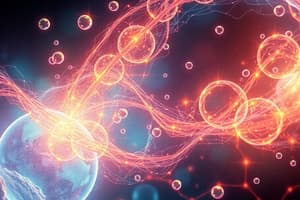Podcast
Questions and Answers
What does a rate law describe in a chemical reaction?
What does a rate law describe in a chemical reaction?
How the reaction rate changes as the concentrations of reactants and products alter.
Explain the concept of reaction mechanisms.
Explain the concept of reaction mechanisms.
Reaction mechanisms describe the sequence of elementary reactions that collectively lead to the overall reaction.
What is the role of a catalyst in a chemical reaction?
What is the role of a catalyst in a chemical reaction?
A catalyst increases the rate of a chemical reaction without being consumed in the process.
How do kinetic measurements contribute to understanding reaction mechanisms?
How do kinetic measurements contribute to understanding reaction mechanisms?
Explain the concept of collision theory in relation to chemical kinetics.
Explain the concept of collision theory in relation to chemical kinetics.
How does temperature dependence affect reaction rates?
How does temperature dependence affect reaction rates?
Explain why the rate of a chemical reaction increases with temperature according to the collision theory.
Explain why the rate of a chemical reaction increases with temperature according to the collision theory.
How is the rate of a chemical reaction related to the frequency of successful collisions between reactant molecules according to collision theory?
How is the rate of a chemical reaction related to the frequency of successful collisions between reactant molecules according to collision theory?
What does the Arrhenius equation describe in terms of chemical kinetics?
What does the Arrhenius equation describe in terms of chemical kinetics?
For a first-order reaction, what is the rate law and how is the rate constant dependent on temperature?
For a first-order reaction, what is the rate law and how is the rate constant dependent on temperature?
What factors influence the temperature dependence of the rate constant in the Arrhenius equation?
What factors influence the temperature dependence of the rate constant in the Arrhenius equation?
How does understanding chemical kinetics impact various fields beyond chemistry?
How does understanding chemical kinetics impact various fields beyond chemistry?
Flashcards are hidden until you start studying
Study Notes
Chemical Kinetics: Rate Laws, Mechanisms, Catalysis, and Temperature Dependence
Chemical kinetics, a cornerstone of physical chemistry, focuses on understanding the rates and factors that influence chemical reactions. This article will delve into the subtopics of rate laws, reaction mechanisms, catalysis, and temperature dependence to reveal how chemical kinetics shapes our understanding of reactions and their applications.
Rate Laws
The rate law, expressed as a mathematical equation, describes how the reaction rate changes as the concentrations of reactants and products alter during a reaction's progress. Rate laws can be determined experimentally and may be influenced by factors such as reaction order (positive, negative, or zero), which indicates how the rate depends on the concentration of each reactant.
Reaction Mechanisms
A reaction mechanism describes the sequence of elementary reactions, or individual steps, that collectively lead to the overall reaction. Some reactions occur in a single step, while others involve multiple steps. Kinetic measurements and other nonkinetic studies provide evidence for a reaction's mechanism.
Catalysis
A catalyst is a substance that increases the rate of a chemical reaction without being consumed in the process. It may lower the activation energy, or the energy barrier that must be overcome for a reaction to occur, thereby allowing the reaction to proceed at a faster rate.
Temperature Dependence
The rate of a chemical reaction increases with temperature because the increased kinetic energy of the reactant molecules enables them to overcome the activation energy barrier more easily. The temperature dependence of a reaction is often described by the Arrhenius equation, which relates the rate constant, (k), to the activation energy, (E_a), and the temperature, (T).
Collision Theory
The collision theory is a microscopic model that describes how reactions occur when reactant molecules collide with sufficient energy and proper orientation. According to this theory, the rate of a reaction is directly proportional to the frequency of successful collisions between reactant molecules.
Temperature Dependence Example
The first-order reaction
[ A \rightarrow \text{products} ]
follows the rate law
[ \text{rate} = k \cdot [A] ]
where (k) is the first-order rate constant. The temperature dependence of (k) is described by the Arrhenius equation:
[ k(T) = A \cdot e^{-\frac{E_a}{RT}} ]
where (A) is the pre-exponential factor, (E_a) is the activation energy, (R) is the gas constant, and (T) is the temperature in Kelvin.
Understanding the principles of chemical kinetics reveals the intricacies of chemical reactions and provides valuable insights into the design and optimization of chemical processes. Knowledge of reaction rates, mechanisms, catalysis, and temperature dependence has far-reaching implications in fields such as cosmology, geology, biology, engineering, and psychology.
Studying That Suits You
Use AI to generate personalized quizzes and flashcards to suit your learning preferences.




